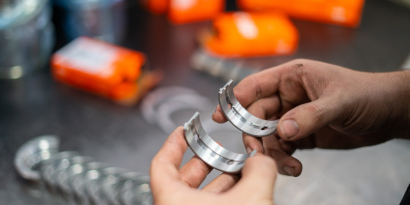Let’s face it: every driver would like to drive peacefully and safely at all times, right? But sometimes the unexpected can happen and, in these cases, it is essential that you don’t go running around without paying attention to the problem, since car engine failures can be signs of more serious issues and, in the end of the day, initiate serious and dangerous situations.
Hence, it is important to know how to identify the signs and possible causes of these defects in order to know how to act when they occur. Remember that this not only helps to ensure a safer driving, but also contributes to avoid greater problems and expenses in the future.
The good news is that, in this article, we’re going to explore some of the most common failures that may occur in your car and share valuable tips to help you identify the possible sources of problems. Let’s go!
Understanding the main car engine failures and the possible sources of the problem
Before we dive into the possible causes of engine failure, it’s very important to understand that, after noticing any sign that something is not right with your car, the advice is to always seek the closest mechanic garage as soon as possible. However, not all problems arise suddenly and, sometimes, the car shows signs that it needs attention. For this post, we list some of the most common signs. Write them down:
1 – Loss of power
One of the most frequent car engine failures in the routine of those who drive, the loss of power makes the driver fell that the car is not accelerating as it should, even when the gas pedal is pushed to the limit. In these cases, there are some possible causes that deserve attention:
Dirty air filter: A clogged air filter reduces the air flow to the engine, impairing the air-fuel mixture.
Clogged exhaust system: Restriction in the exhaust system, such as a clogged catalytic converter, may affect the engine performance.
Problems in the fuel injection: Dirty or defective injectors may lead to an inefficient combustion.
2 – Engine overheating
When the indicator of temperature in the instrument panel reaches critical levels – or when, in more serious cases, you see smoke coming out from the hood –, it’s worth finding a safe place to park and watch for the following possibilities:
Lack of engine coolant: An inappropriate level of engine coolant or leaks in the engine cooling system may cause overheating.
Problems in the cooling system: A defective thermostat, water bomb, or clogged radiator may contribute to overheating.
3 – Weird noises coming from the hood
Do you know when you’re driving and, suddenly, you start hearing uncommon beats, clicks, or creaks coming from the engine compartment? Well, it’s certainly not a good thing! This, which is one of the most worrying car engine failures, may occur for the following reasons:
Valve problems: Tics or beats may show an inappropriate valve looseness or wear.
Piston problems: Deep knocking sounds may suggest problems with the piston or piston rings.
Problems in connecting rods: Creaks or metallic beats batidas may be caused by problems in the connecting rods, which connect the piston to the crankshaft.
4 – Problems to start the car
This is one of those problems that occur When you try to start the car and don’t succeed. You may notice that the car has difficulty to start or that the start is much slower and weaker than usual. This means that the starter motor is turning with low energy, and may it’s time to seek for help. The sources of the problem may be as follows:
Low or defective battery: A battery with low charge might not provide enough energy to start the car.
Defective starter motor: Problems in the starter motor may cause difficulties in engine start.
Ignition switch with problems: A worn out switch may affect engine start.
But what should you do if your engine breaks down or if these problems occur?
As we explained before, car engine failures not Always occur suddenly and, of course, They are not always “fulminant”. Hence, if your car engine starts to show any of the problems that we listed above during driving, it is essential to take some immediate actions in order to avoid additional losses and ensure your safety. Check it out:
Reduce the speed: Drive carefully until you can stop at a safe place – but don’t hit the brake at once! Give a warning sign and do everything calmly.
Check the panel: Check the instrument panel for warning lights and signs that may provide clues about the source of the problem, and remember that the car manual can help you interpret them.
Don’t try to solve it on your own: Unless you are an experienced mechanic, don’t try to solve the problem on your own. This may worsen the situation.
Seek for a mechanic garage: If possible, talk to a mechanic garage that you trust and ask for help as soon as possible. However, in simpler and common situations, try to be satisfied with the closest mechanic garage – this may solve the problem in a quicker manner.
And remember: the best way to avoid car engine failures is to maintain a frequent maintenance and inspection routine. This includes oil change, filter replacement, verification of ignition system, and Much more. Paying due attention to warning signs, you maintain the engine under good operating conditions and ensure a safer and more reliable driving!
We hope that this article has helped you clarify the main topics related to car engine failures. If you have any questions, don’t hesitate to use the space below to send your question! And for more tips like these ones, stay tuned here and in the blog and follow RIO in social media. See you next time!





